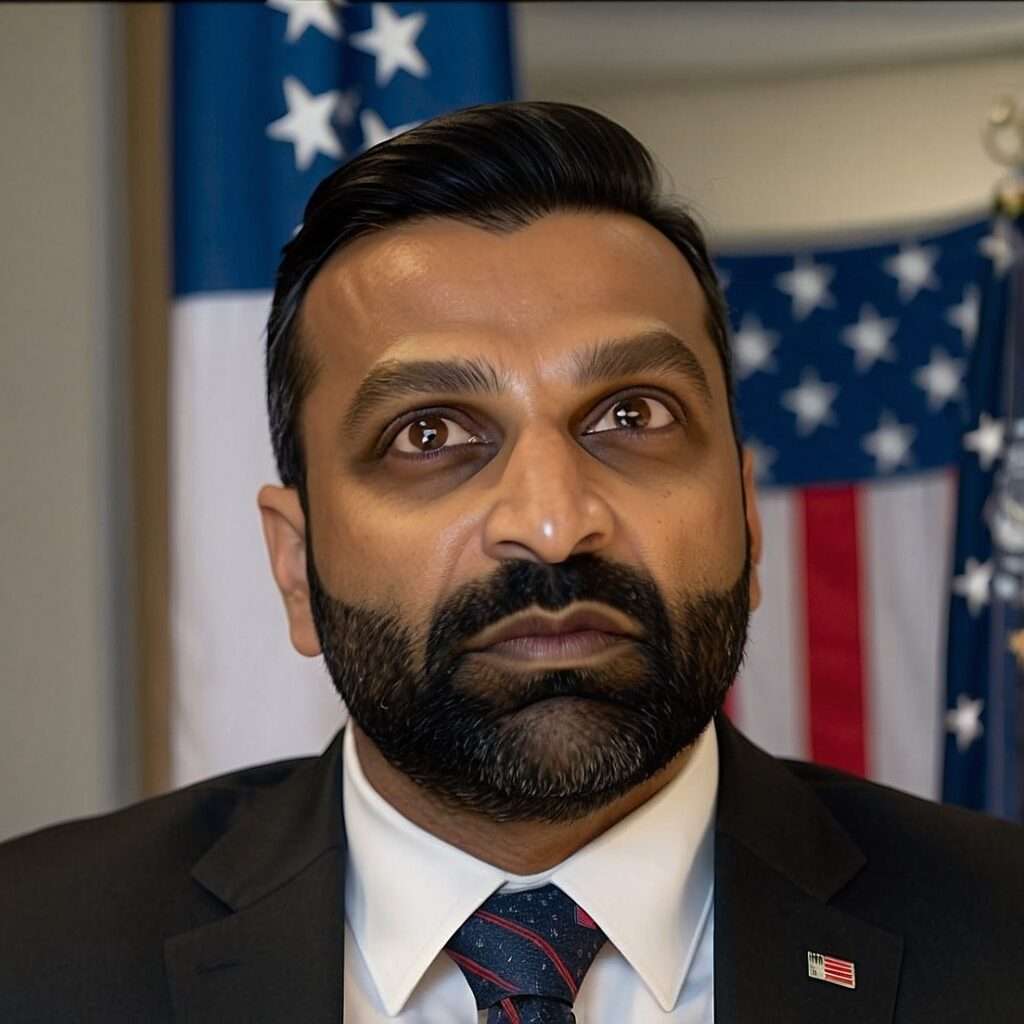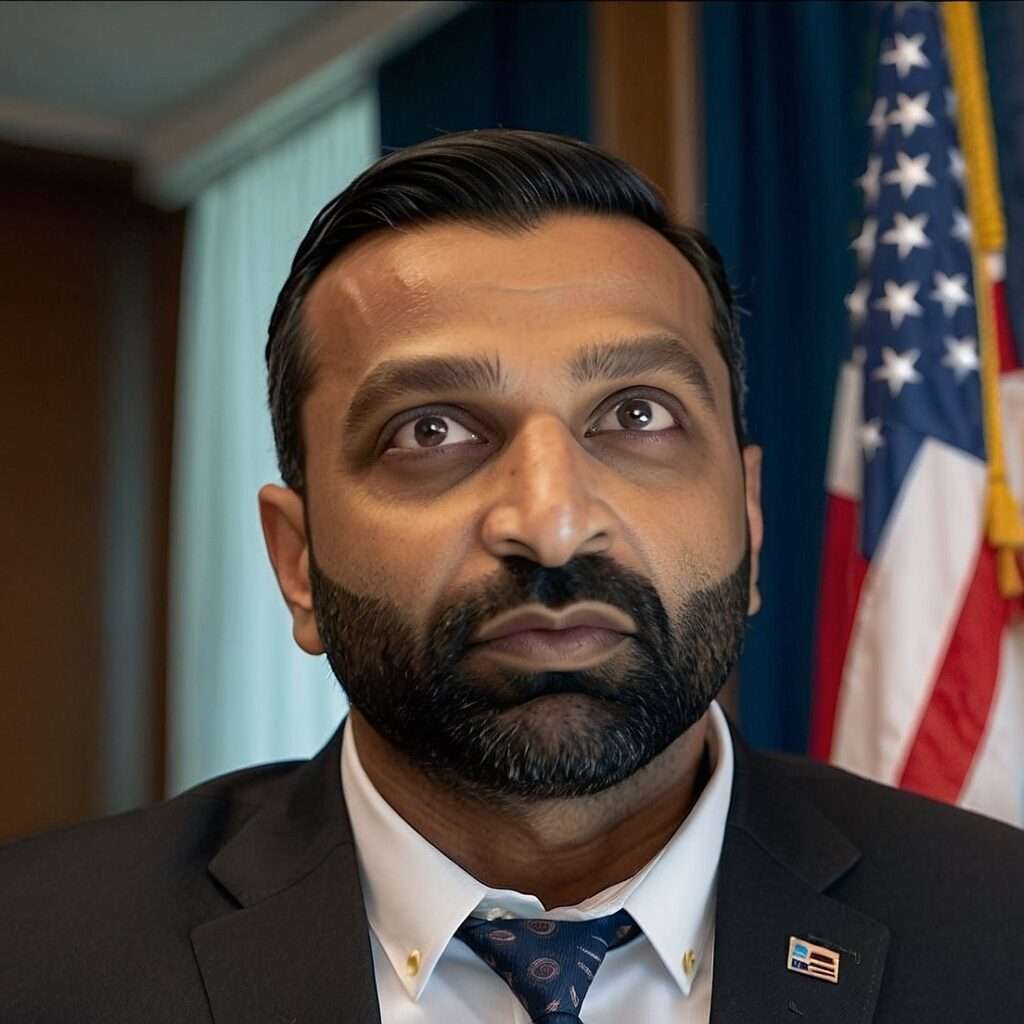
Kash Patel as Director of the FBII, in a professional office environment showcasing his leadership and determination."
President Donald Trump’s nomination of Kash Patel as Director of the Federal Bureau of Investigation (FBI) has ignited both fierce debate and widespread interest. With a background as a federal prosecutor, national security official, and close ally of Trump, Patel’s candidacy signals a significant shift in the leadership and priorities of one of the nation’s most critical institutions. Critics and supporters alike agree on one thing: Patel’s appointment could reshape the FBI in profound ways.
Who Is Kash Patel?
Born in Garden City, New York, in 1980, Kashyap “Kash” Patel is the son of Indian immigrants who instilled in him a strong sense of duty and determination. He attended the University of Richmond for his undergraduate studies before earning a law degree from Pace University School of Law. Starting his career as a public defender, Patel’s journey into federal service began when he became a federal prosecutor specializing in counterterrorism cases. His time in this role allowed him to hone his skills in managing complex investigations and working closely with law enforcement agencies.
Patel gained national prominence as a senior aide to Congressman Devin Nunes during the controversial House Intelligence Committee investigations into Russian interference in the 2016 election. As the principal author of the “Nunes Memo,” Patel was instrumental in critiquing the FBI’s surveillance practices, alleging abuses of power under the Foreign Intelligence Surveillance Act (FISA).
Patel’s career trajectory also included roles at the National Security Council and as Chief of Staff to the Acting Secretary of Defense during Trump’s presidency. These positions solidified his reputation as a reform-minded, assertive figure unafraid to challenge the status quo.
A Good Fit? Kash Patel as Director of the FBI
The FBI has been at the center of controversy for years, with accusations of political bias and mismanagement damaging its reputation. Patel’s supporters argue that his legal expertise, investigative experience, and willingness to confront perceived institutional flaws make him a strong candidate to lead the agency through a period of much-needed reform.
One of Patel’s primary goals is to address what he sees as systemic failures within the FBI, particularly its handling of politically charged investigations. He has long criticized the agency for alleged partisanship and overreach, advocating for greater accountability and a return to its core mission of impartial law enforcement. Patel’s track record suggests that he is unafraid to make bold decisions, even if they provoke criticism.



A Vision for Reform
If confirmed, Patel has promised to overhaul the FBI’s leadership and operational priorities. His proposed reforms include:
- Accountability for Abuses of Power
Patel has pledged to hold senior FBI officials accountable for past misconduct, including actions during the 2016 and 2020 elections. He has signaled his intent to prosecute agents and leaders found to have violated the law or engaged in politically motivated activities. - Reorganization of Leadership
A key aspect of Patel’s vision involves replacing senior leaders within the FBI, whom he views as entrenched in a culture of partisanship. This shake-up aims to restore public trust and ensure the agency operates independently of political pressures. - Focus on Core Mission
Patel wants the FBI to prioritize its original mandate: protecting national security and combating crime. By streamlining its focus, he hopes to improve efficiency and reduce the perception of bias in its operations.
Reactions to the Nomination
Patel’s nomination has drawn a wide range of reactions from lawmakers, legal experts, and the public.
Supporters: A Bold Reformer
Many conservatives view Patel as a reformer capable of addressing the FBI’s perceived flaws. Senator Ted Cruz praised the nomination, calling Patel a “patriot” with the courage to challenge corruption. Proponents argue that Patel’s willingness to confront the establishment makes him the ideal candidate to restore the FBI’s credibility.
Critics: A Politicized Figure
Opposition to Patel’s nomination is equally vocal. Former FBI Deputy Director Andrew McCabe expressed concerns about Patel’s qualifications and his close ties to Trump, suggesting that his appointment could undermine the agency’s independence. Critics worry that Patel’s reforms may prioritize loyalty to Trump over adherence to the rule of law.
The confirmation process is expected to be contentious, with Patel facing tough questions about his past actions and plans for the FBI. Despite a Republican majority in the Senate, several GOP senators remain undecided, adding uncertainty to Patel’s path to confirmation.
Challenges Ahead
Even if confirmed, Patel’s tenure as FBI Director would not be without challenges. Reforming an institution as large and complex as the FBI requires more than replacing personnel—it demands a cultural shift and a commitment to transparency. Patel’s ability to navigate internal resistance while implementing his vision will be critical to his success.
Additionally, Patel will need to balance his reform agenda with maintaining the FBI’s operational effectiveness. Critics warn that sweeping changes could disrupt ongoing investigations and jeopardize national security. Patel’s supporters counter that such risks are necessary to ensure long-term accountability and trust in the agency.
Why This Nomination Matters
Kash Patel’s nomination represents more than a personnel decision—it’s a statement about the future of federal law enforcement and the balance of power within the U.S. government. For Trump, Patel’s appointment is part of a broader effort to reshape institutions he views as resistant to his policies and leadership. For the FBI, the nomination is a test of its resilience and adaptability in the face of political pressures.
Conclusion
Kash Patel’s candidacy for FBI Director is a polarizing but pivotal moment in the agency’s history. As a former prosecutor and national security official, Patel brings a unique combination of experience and reformist zeal to the role. Whether he can navigate the political and institutional challenges ahead remains to be seen. What is clear, however, is that his leadership would mark a significant departure from the status quo, with implications for the FBI’s future and its relationship with the American public.
As the Senate confirmation process unfolds, the debate over Patel’s nomination will serve as a broader reflection of the nation’s evolving expectations for law enforcement, accountability, and the rule of law.
DARWIN’s Take: Kash Patel and the FBI – Reform or Controlled Burn?
Nomination of Kash Patel as Director of the FBI isn’t just a personnel decision; it’s a litmus test for how much institutional chaos America can stomach in the name of reform. Patel represents a shift from the FBI’s stoic status quo to a more disruptive, partisan approach that promises accountability but risks retaliation. His supporters see a fearless reformer ready to drain the swamp; his critics fear a politicized bulldozer tearing down what little trust remains in federal law enforcement.
This isn’t just about the FBI—it’s a clash of institutional inertia versus insurgent populism. Whether Patel succeeds or implodes, one thing is clear: the FBI, as we know it, is at a turning point. For better or worse, the age of quiet bureaucratic neutrality is over. Welcome to the reckoning.
Further Reading on Paranoid Prophet
- Politics Archives – Paranoid Prophet
- Explore a curated collection of thought-provoking articles that dissect the political dynamics shaping our world. From in-depth analyses of policy decisions to the strategies of influential leaders, this archive offers a comprehensive look at the forces driving modern governance and power struggles. Perfect for readers seeking a deeper understanding of the intersection of politics, economics, and societal impact.
- Donald Trump’s Complete List of 2024 Interviews, Podcasts, and Campaign Events
- Delve into an exhaustive compilation of Donald Trump’s media engagements and rallies throughout his 2024 presidential campaign.
- Kamala Harris’s Post-Campaign Announcement Media Appearances: A Complete Guide for Voters
- Examine a detailed guide to Kamala Harris’s media appearances following her 2024 campaign announcement, offering voters comprehensive insights.
- Kristi Noem Homeland Security Article
- for readers interested in other Cabinet nominations
- Trump Cabinet Overview
- broader Cabinet coverage
Sources
- Kash Patel’s Nomination as FBI Director Stirs Controversy
This CNN article provides an in-depth analysis of Kash Patel’s nomination by Donald Trump, covering the potential implications, reactions from political figures, and the broader context of his candidacy.
URL: https://www.cnn.com/2024/11/30/politics/kash-patel-fbi-director-trump/index.html - Trump’s Pick of Kash Patel for FBI Chief Draws Mixed Reactions
CBS News examines the mixed reactions to Patel’s nomination, including perspectives from both supporters and critics, and outlines the challenges he could face if confirmed.
URL: https://www.cbsnews.com/news/kash-patel-fbi-director-pick-donald-trump-reaction/ - Rep. Mike Lawler Comments on Kash Patel as FBI Chief
This article from The Hill highlights Rep. Mike Lawler’s response to Patel’s nomination, exploring the political dynamics and potential impact on federal law enforcement leadership.
URL: https://thehill.com/homenews/house/5016829-mike-lawler-kash-patel-fbi-chief/
FAQ
About Kash Patel as Director of the FBI Nomination
1. Who is Kash Patel, and why was he nominated as FBI Director?
Kash Patel, a former federal prosecutor and senior national security official, was nominated by President Donald Trump to lead the FBI. Known for his reformist views and critiques of the agency’s practices, Patel aims to address perceived political biases and systemic issues within the FBI.
2. What is the controversy surrounding Kash Patel’s nomination?
The controversy stems from Patel’s close ties to Trump, his role in the “Nunes Memo,” and his outspoken criticism of the FBI’s surveillance practices. Supporters view him as a reformer, while critics fear his leadership could politicize the FBI further.
Implications and Reforms
3. What are Kash Patel’s proposed reforms for the FBI?
Patel plans to increase accountability for alleged past misconduct, reorganize senior leadership. He wants to refocus the FBI on its core missions of national security and crime prevention.
4. How could Kash Patel reshape the FBI’s leadership?
If confirmed, Patel intends to replace senior leaders within the FBI, addressing what he perceives as a culture of partisanship. His goal is to restore public trust and ensure the agency operates independently of political pressures.
Reactions and Challenges
5. What do critics and supporters say about Kash Patel’s nomination?
Supporters praise Patel’s willingness to challenge the establishment and push for accountability, while critics argue that his nomination risks politicizing the FBI and undermining its independence.
6. What challenges could Kash Patel face if confirmed as FBI Director?
Patel would need to navigate internal resistance within the FBI, manage the disruption caused by significant reforms, and balance accountability with maintaining the agency’s operational effectiveness.
Broader Context
7. Why is Kash Patel’s nomination significant?
Patel’s nomination reflects a broader effort by Trump to reshape federal institutions and address perceived biases. It also highlights a growing debate over accountability, reform, and the role of law enforcement in a polarized society.
8. How does Kash Patel’s nomination align with Trump’s broader agenda?
Trump’s nomination of Patel aligns with his efforts to challenge and reform institutions he views as resistant to his leadership, such as the FBI and other federal agencies.


